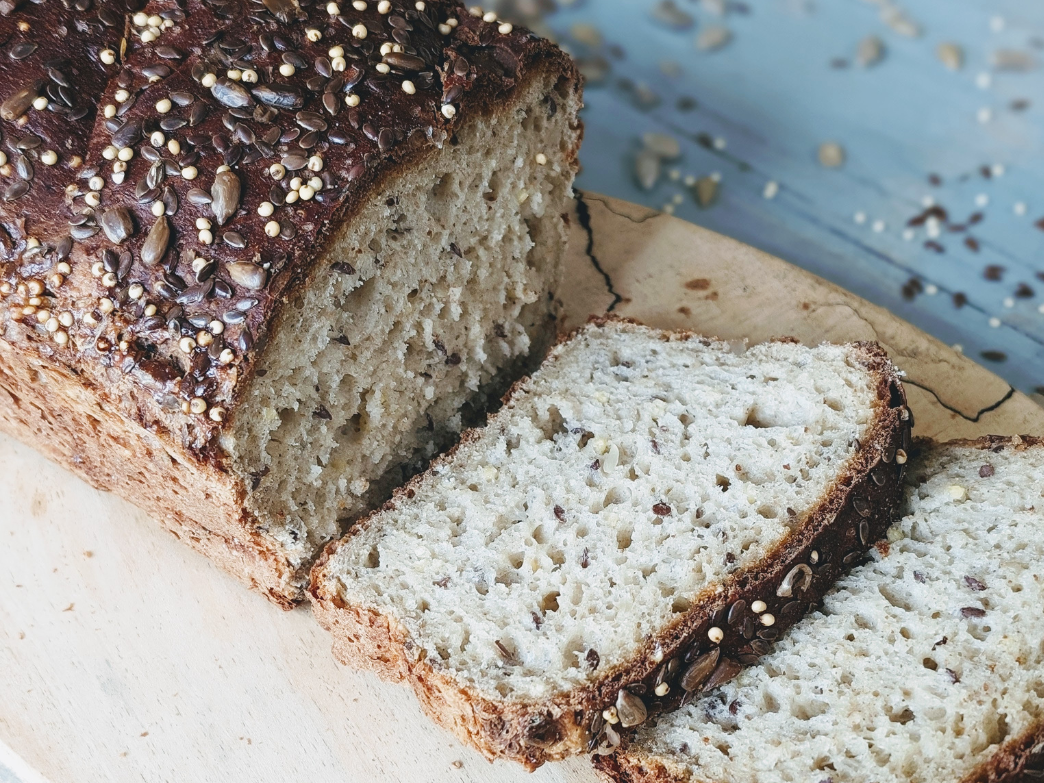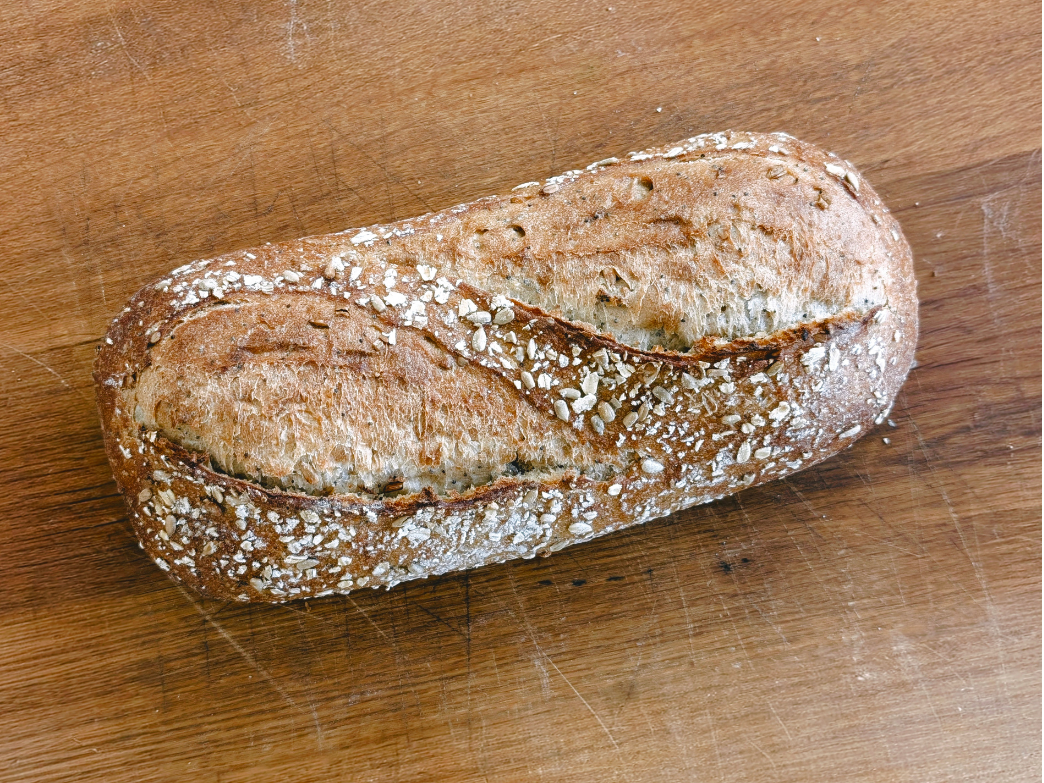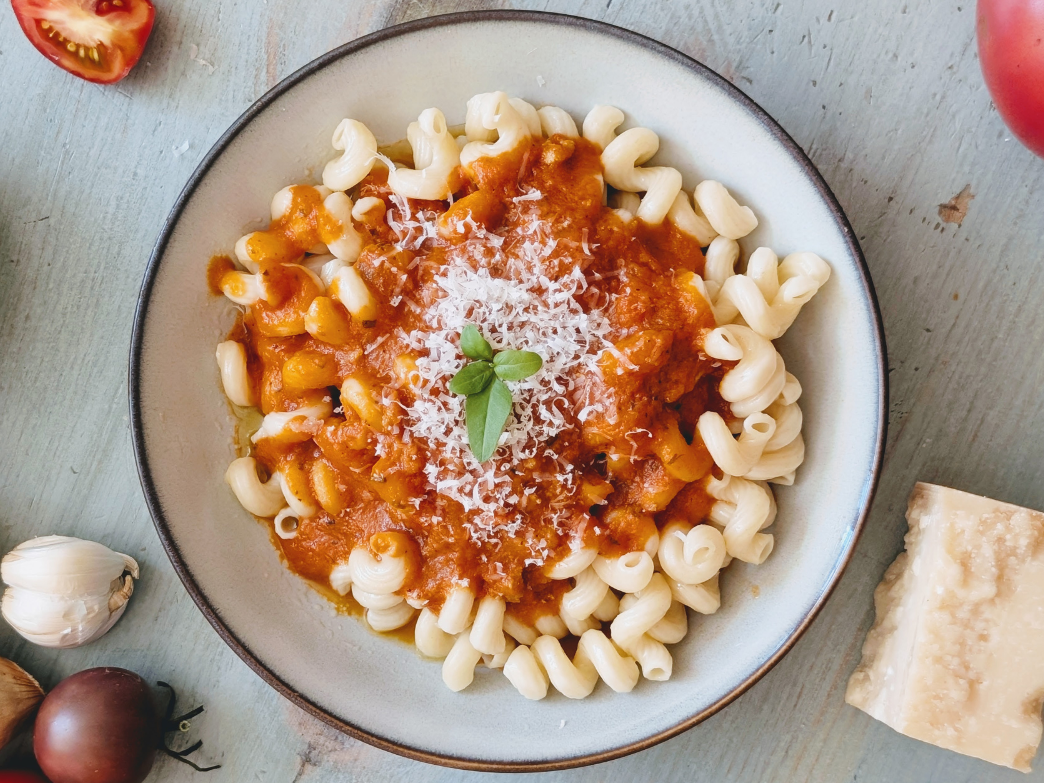By Lucy Yanckello, Ph.D.
Bread is a staple in most cultures, with each region having its own take on the carbohydrate-based food option. However, the popularity of eating a gluten-free diet – even when not medically necessary – has grown in the past few years. As such, breads made from various forms of flour that do not contain gluten have come onto the market. Read on to learn more about the gluten-free bread options available, and how these products compare to wheat-based bread options.
Is gluten-free bread healthy? Is gluten-free bread healthier than regular bread?
The most important benefit of gluten-free bread is that it allows those with gluten intolerance and gluten allergies to enjoy bread. From a nutritional standpoint, many gluten-free breads do contain fewer key nutrients, including protein and fiber, than wheat breads. However, wheat flour is often fortified with additional nutrients that alternative flours are not. Unless you have a disease, or other condition that precludes you from eating gluten, you will likely not get any added benefit of avoiding gluten in your diet.
Why do people prefer gluten-free bread? Is gluten-free bread better for you?
Some people prefer gluten-free bread because they cannot eat gluten or because they have a sensitivity to gluten. But for people without a gluten sensitivity or allergy, regular bread may actually have better nutrition. Although it may be tempting to be lured in by the “clean eating” trends, eating gluten-free bread will provide you with less health benefits than wheat-based breads. Gluten-free bread is made with refined grains or starches that lack the fiber and nutrients found in whole grains.
Is gluten-free bread harder to digest? Is gluten-free bread easier to digest?
Gluten-free bread is highly processed in order to obtain the elasticity present in traditional bread that comes from gluten. Due to this, many fillers may be added that can cause digestive discomfort. Additionally, there is less fiber content in gluten-free bread which may affect digestibility.
Is gluten-free bread good for diabetics?
Gluten-free bread is considered a high glycemic index food, similar to wheat-based bread. Glycemic index is a measure of how quickly a food can cause your blood sugar to rise on a scale of 1-100, with foods with a GI of 70 or higher being considered “high GI foods”. For context, gluten-free bread has a GI of 90, and wheat-based breads have a GI closer to 100. As such, neither option is a good fit for diabetics, since keeping blood sugar under control is vital to those with the condition.
Is gluten-free bread low FODMAP?
Gluten-free bread can find a place in the diet of those who need to eat low-FODMAP. FODMAP is an acronym for Fermentable Oligosaccharides, Disaccharides, Monosaccharides, and Polyols, which are types of carbohydrates that easily ferment in the digestive system. This causes uncomfortable symptoms such as bloating, pain, and flatulence. As rye, wheat, and barley are all high-FODMAP, gluten-free breads made with other low-FODMAP ingredients such as arrowroot, cornmeal, oat bran, and rice flour are good options.
Is gluten-free bread low carb?
Most gluten-free bread is not low carb. There are some gluten-free breads made with low carb flours, such as almond, coconut, or sesame. However, most gluten-free bread contains the same amount of carbohydrates as wheat-based breads.
Is gluten-free bread good for weight loss?
Gluten-free bread may not be better for weight loss, depending on the reasons why you are eating gluten-free bread. Although research is lacking on the effects of a gluten-free diet on weight loss alone, long-term studies of individuals that are generally healthy and consume a diet low in wheat and other gluten-containing grains show some concerning evidence against a gluten-free diet, unless medically necessary. Gluten-free diets may promote nutrient deficiencies, increase the risk of certain diseases, and may actually cause weight-gain. Gluten-free flours are not fortified with vital micronutrients and vitamins as wheat flour is, leading to deficiencies in key nutrients such as iron, b-vitamins, and calcium.
Research is somewhat conflicting on weight loss or gain with a gluten-free diet, but some suspect that the reason for weight gain on a gluten-free diet could be related to an increased intake of highly processed gluten-free foods that contain higher amounts of fat and sugar to make them taste better. It is also speculated that weight loss while abstaining from gluten is tied more to the other healthy dietary choices made in tandem and not to the elimination of gluten itself. It is important to remember that what you do eat is more important for weight loss than what you remove from your diet.
Is gluten-free bread keto friendly?
Gluten-free bread is relatively high in carbohydrates and low in fat. As the ketogenic diet focuses on the opposite choices for your foods (high in fat, low in carbohydrates), gluten-free bread is likely not suitable for those following a keto diet. Although there are some exceptions, gluten-free bread should generally be avoided when on a ketogenic diet.
Is gluten-free bread wheat free?
Gluten-free and wheat-free are not the same thing. It is possible that a food is wheat-free but contains gluten from other sources. However, it is not possible that something is gluten-free and contains wheat, because wheat is one of the major sources of gluten.
Where can I buy the best gluten-free bread online?
At Wildgrain, we specialize in making high-quality, fresh baked goods that are delivered directly to your door. Wildgrain is the first bake-from-frozen delivery subscription service for fresh pasta, breads, and pastries. Our gluten-free breads include Gluten-Free Country Loaf, Gluten-Free Slow-Fermented Seeded Loaf, and Gluten-Free Sourdough Loaf. Learn more about Wildgrain and our artisanal baking and cooking methods.
About the Author
Lucy Yanckello received her Ph.D. in nutrition from the University of Kentucky College of Medicine. She currently works as a medical writer and enjoys being able to help people better understand nutrition and science.
This content is for informational use only and does not replace professional nutrition and/or medical advice, diagnosis or treatment. It is not a substitute for and should not be relied upon for specific nutrition and/or medical recommendations. Please talk with your doctor about any questions or concerns.



